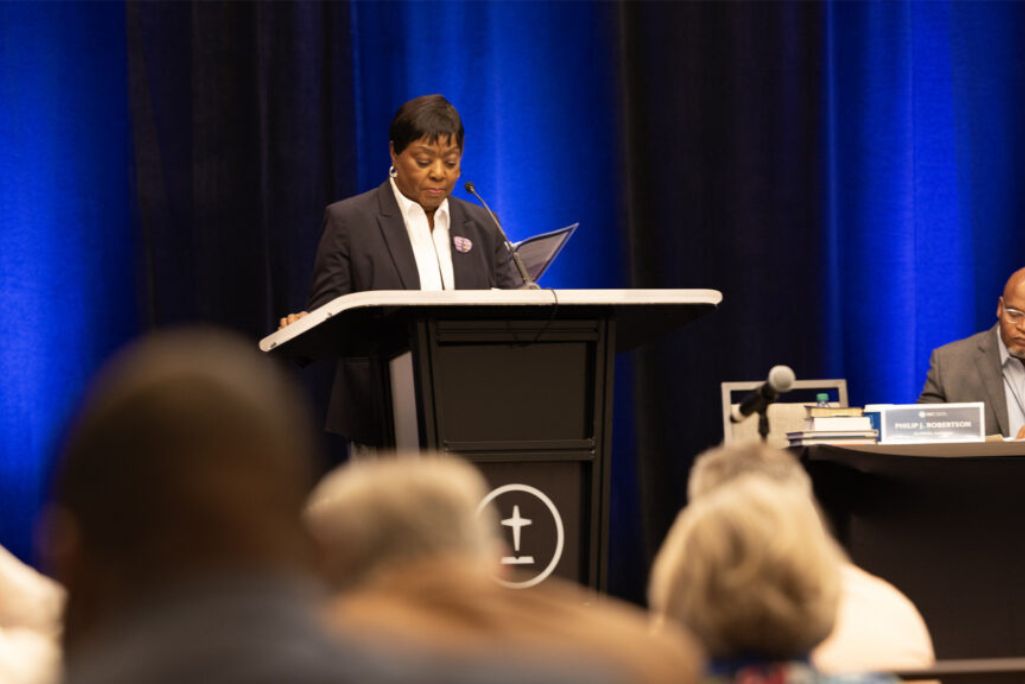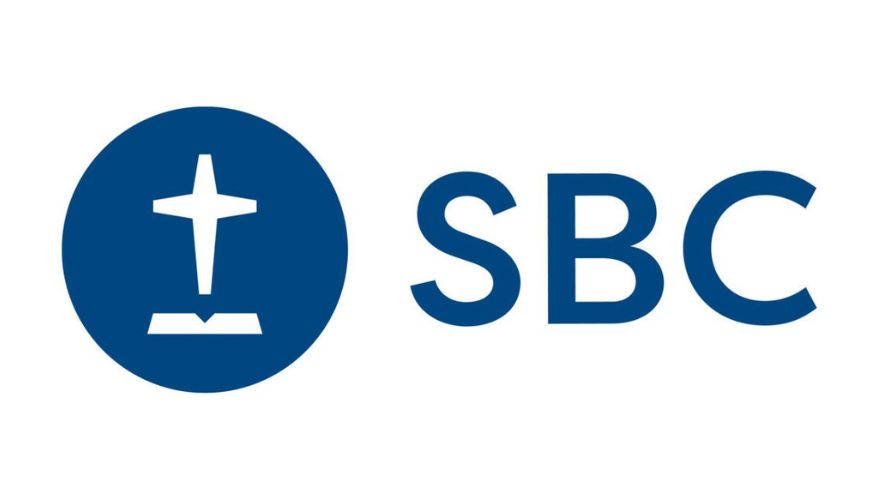
Carolyn Fountain, chair of the Executive Committee's Committee on Convention Missions and Ministry, presents her report to the EC Sept. 17, 2024, in Nashville.
(EDITOR’S NOTE — This story has been updated to clarify the vote and discussion related to a proposed bylaw amendment related to the Credentials Committee.)
NASHVILLE (BP) — Dozens of agenda items awaited discussion and action by the Southern Baptist Convention (SBC) Executive Committee (EC) members at their fall meeting this week. The committee made short work of its many referrals and recommendations, including consequential ones like finding a new home for sexual abuse prevention in the SBC and releasing a total dollar amount for legal expenditures incurred by the EC since 2021.
The EC dealt with all of its business without its usual Monday night plenary session, as that time (Sept. 16) was reserved for the formal installation of its new president and CEO Jeff Iorg, during which Iorg stressed the SBC’s continuing “force for good” in the world.
In three plenary sessions on Tuesday (Sept. 17), EC members heard from new SBC President Clint Pressley, heard a brief update from Iorg and passed 32 recommendations from EC officers and various standing committees with little discussion and almost no opposition.
One of the recommendations approved Tuesday was to create a department within the EC to assist churches in the area of sexual abuse prevention and response.
“We have had two task forces that have done difficult and hard work,” Iorg told EC members. “But it’s time to stop talking about what we’re going to do and take an initial, strategic step of action that puts into place an administrative response to this issue.”
Members also announced Tuesday the EC has spent more than $12.1 million since 2021 in fees related to an investigation of its handling of sexual abuse allegations and subsequent litigation.
The numbers show the EC has “done everything in our power to take the burden on ourselves to protect the Cooperative Program and the work of the convention and its entities,” said Adam Wyatt, chairman of the EC’s Committee on Convention Finances and Stewardship Development. “And it is our effort of trying to just be as transparent and clear about where we really are.”
In a short report to members Tuesday morning, Iorg struck a personal tone about his first few months in the role of EC president. He has been “capitalizing on the key relationships I have” in the convention, he said, meeting with entity leaders, state convention leaders and others, adding that he plans to visit 17 state Baptist convention meetings this fall.
“We believe in partnership,” he said.
After the final plenary session, which was held in executive (closed) session, EC Chairman Philip Robertson reported that members had voted to increase the SBC Operating Budget to $11.8 million and to authorize Iorg to execute a loan secured by the SBC building in Nashville as well as to place the building up for sale.
Robertson also reported that EC members received and approved a report from the EC’s legal strategies committee.
Recommendations from EC officers
Two of the recommendations from EC officers to the full board had to do with the action to create a permanent home for sexual abuse prevention and response in the SBC within the Executive Committee. Other actions EC members took in accordance with officer recommendations include:
- Retaining Fidelis Law, PLLC, as permanent legal counsel for the SBC and the SBC EC.
- Amending EC bylaws regarding the way EC standing committees are formed to bring the bylaws in accordance with Tennessee state law.
- Amending the EC personnel policies manual as it relates to the housing allowance for EC employees.
In response to motions referred to the EC adopted by messengers to the 2024 SBC annual meeting, EC members:
- Agreed to report to messengers at the 2025 SBC annual meeting in Dallas that the EC’s primary legal counsel represents the convention’s position on gender and sexuality.
- Declined to amend the EC’s personnel policies related to the use of alcohol.
- Declined to address the issue of Calvinism and Reformed Theology, stating that “controlling the teaching content at convention entities is beyond the purview of the Executive Committee.”
Convention finances and stewardship
Four of the nine recommendations brought by the Committee on Convention Finances and Stewardship Development were received as information, pertaining to budget and financial statements as well as entity activity reports. A referral calling for the reallocation of all Cooperative Program funds from the Ethics & Religious Liberty Commission (ERLC) to the International Mission Board (IMB) was declined because the budget allocation had already been approved by messengers in Indianapolis.
Trustees responded to a referral asking for a schedule of legal expenses between 2021-2024 by presenting slides detailing those fees. The full report will be made available to messengers at the 2025 SBC annual meeting.
The committee presented recommendations, approved by the trustee board, to decline motions to publish a schedule of payments exceeding $5,000 to another entity. Two referrals asking to amend the Business and Financial Plan for greater transparency and to disclose IRS Form 990 information were declined because steps to address those concerns were already underway through proposed changes and clarifications to the Business and Financial Plan, the committee reported.
Committee on Missions and Ministry
In a two-part recommendation, the Committee on Convention Missions and Ministry declined a referral from the 2024 SBC annual meeting to recommend amendments to Bylaw 8 regarding the Credentials Committee process to ensure that the messenger body has the sole authority for seating messengers. The referral came from recommendations presented by the SBC’s Cooperation Group.
In a complement to the recommendation, the committee recommended that the Executive Committee ask the SBC Committee on Order of Business to publicly recognize new messengers at annual meetings, beginning at the 2025 meeting in Dallas.
EC member David Sons inquired about the reasoning for the denial. Committee Chairwoman Mollie Duddleston said the current role of the Credentials Committee protects privileged information that would be inappropriate for discussion among messengers on the annual meeting floor.
In declining to recommend the amendments, the committee said, “The Executive Committee acts ad interim for the Convention; however, the Convention’s messengers have the final authority on the seating or unseating of messengers at the SBC annual meeting, based on the guidelines and provisions in Bylaw 8.”
In other action, the EC:
- Unanimously agreed to recommend to messengers to the 2025 SBC annual meeting in Dallas to amend Article XIV of the SBC Constitution to specify that a two-thirds vote of messengers be required in two consecutive annual meetings to amend the Baptist Faith and Message 2000.
- Unanimously declined to ask the SBC president to appoint a task force to amend or revise the Baptist Faith and Message 2000, and that churches and entities, acting autonomously, may choose to adopt confessional, doctrinal or theological statements at their discretion.
- Unanimously declined to recommend a proposed amendment to Article VI of the SBC Constitution asking entities to publish any conflict-of-interest policies related to them and to inform messengers that the EC, in cooperation and collaboration with SBC entities, institutions and commissions, is addressing conflict-of-interest and other issues by proposing changes and clarifications to the SBC Business and Financial Plan.
- Unanimously approved a recommendation to amend SBC Bylaw 15 regarding the Committee on Nominations, so that “any person elected to serve on any of the boards, institutions, commissions, the Executive Committee or convention standing committees shall affirm the convention’s adopted statement of faith.”
- Unanimously declined to ask messengers to change governing documents to require entities to report on actions taken on messenger-approved recommendations from work groups or task forces. Instead, the EC will inform messengers that SBC Bylaw 26B provides guidelines for entities and states that, “On all matters referred by the Convention, entities shall respond in writing at the close of their report in the Book of Reports and Annual…”, and that the EC will adjust its administrative practices to ensure all entities are informed of all convention actions, not just referred motions, and the entities will publish the responses to those actions in the Book of Reports.
Events and strategic planning
Messengers will have an easier time getting reintroduced next June in Dallas as the Committee for Events and Strategic Planning approved a referral asking for names to be printed on both sides of name tags, beginning next year.
The committee also amended Bylaw 20 in a referral asking for more timely access to submit resolutions. The amended version calls for resolutions to be submitted for review and consideration as early as March 15 but no later than May 15. The initial report of the Committee on Resolutions shall be released no later than seven days prior to the annual meeting, with the final report published in the first day’s bulletin.
The committee declined referrals for additional time for questions during entity reports and to form a task force that would study the feasibility of remote participation.
The committee expressed that while it desires to see the maximum number of messengers participating in the annual meeting, previous studies outlined “prohibitive costs, technological obstacles and legal challenges” to allowing remote participation.
The technological mountain of allowing votes and discussions across multiple time zones and oceans to accommodate all Southern Baptists within a specific window is considerable, to say the least. But more than that, it would cause “administrative and polity chaos,” Iorg told EC members.
Committee on Southern Baptist Relations
The EC unanimously approved the Committee on Southern Baptist Relations’ recommendation to decline a referral to establish a task force to study how churches minister to persons with special needs.
In declining the motion, the EC affirmed the “importance of ministry to special needs communities” and encouraged churches to use resources already available to them through Southern Baptist entities and ministries, including those from Lifeway Christian Resources and the Woman’s Missionary Union.
In other action, the EC unanimously approved the Southern Baptist Relations Committee’s recommendations to:
- Decline a referral to form an ad-hoc committee to study elders and deacons in local churches.
- Decline a referral to direct the EC to publish the contact information for trustees of all entities.
- Decline a referral to direct the EC to form a task force to study the long-term effects of vaccine mandates on IMB missionaries.
Regarding entity trustee contact information, the EC said it affirms trustee accountability and availability to Southern Baptists and currently publishes mailing addresses for all trustees and standing committee members on its website and in the SBC Annual. The EC said it also encourages each entity to list the email of its board chairperson on its website.
(EDITOR’S NOTE — Laura Erlanson, Scott Barkley, Diana Chandler and Brandon Porter contributed to this report.)


